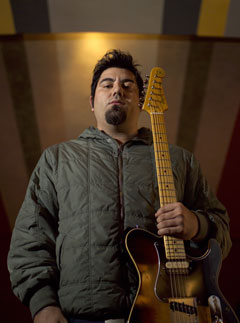


Over the course of four hit albums, the Deftones have honed one of the most dramatic and distinctive sounds in heavy rock. Their songs pulsate with startling dynamic shifts: vocals veer from whispers to screams. Bone-crunching riffs alternate with delicate, ethereal passages.
Central to the group's sound is the guitar work of frontman Chino Moreno. While co-guitarist Stephen Carpenter anchors the group with weighty seven-string riffs, Moreno serves as colorist-in-chief, providing clean-toned textures and subtle atmospherics. Moreno and Carpenter have played together since they formed the Deftones as high school students in Sacramento, California.
The Yamaha guitar sounds like a buzzsaw--and I mean that in a good way. The best word I can think of to describe the tone is relentless.
"Our roles complement each other," says Moreno, speaking from Norfolk, Virginia, where the band is on tour. "Stephen is a straight metalhead-he wears it on his sleeve. I tend to play more melodic things. He lays down that big mass of guitars, and my parts add the color within that."

Moreno says he never had much interest in metal, even as a kid. "Rap was the first thing that caught my attention when I was young. I'm talking about the early electronic stuff, like Afrika Bambaataa. That's still my favorite kind of hip-hop." The next big influences were new wave bands, particularly Depeche Mode. "They used the same electronic sounds, but they incorporated melody," notes Chino. "That was the ultimate for me: the electronic instrumentation I liked, but with lots of swirling melodies. I didn't really listen to much metal until I got into this band."
The Deftones are on tour despite the fact that their last record, Deftones, was released in early 2003. "We just came out to play, because we've been off the road for a year, and we want to get tight as a band again," Moreno explains. "We spent all summer writing 18 songs for a new record. But when we write records, we never play anything old-only the new stuff. So it's been a long time since we played any of our old songs."
The as-yet-untitled disc marks a change for the group, whose previous albums were produced by Terry Date (Soundgarden, Pantera, White Zombie). This time around, they'll be collaborating with Bob Ezrin, whose three decades of production credits include such classic-rock icons as Alice Cooper's School's Out, Aerosmith's Get Your Wings, and Pink Floyd's The Wall.
"Terry Date is a super-cool guy and totally great to work with," says Moreno. "But we wanted to try something different. Terry isn't the sort of producer who rearranges your songs-he's more of an engineer- type producer. But when we met with Bob, within five minutes he started helping us construct songs in new ways. We've never had that sort of direct creative input before, and it was very interesting. And obviously, he's produced a lot of great records. We're not trying to make a concept album, necessarily, but we do want to create something that takes you on a complete journey from start to finish. So who better to work with than the guy who produced The Wall?"
Which isn't to say that the Deftones are pursuing a more retro sound. "We're not changing our style or anything," insists Chino. "But on the last record, a lot of our songs were based on a sort of laid-back, strummy sound. I'm not saying we were lazy, exactly, but the new music has more parts, more changes, more dynamics. My favorite part about the Deftones has always been our dynamics: loud to soft. Laid-back to energetic. Those dynamics have always been there for us, but this time we're really going to try to attack them harder."
Moreno's current guitar of choice is a Yamaha PAC1511MS Mike Stern signature Pacifica model-a single-coil, single-cutaway ax not generally associated with heavy rock. "Actually," notes Moreno, "the Yamaha guitar sound is way more aggressive than the fatter, fuzzier sound I was getting before. It's more like a buzzsaw-and I mean that in a good way. The treble is abrasive in a good way. The best word I can think of to describe the tone is relentless. Since Stephen's sound is such a big, noisy bed of solid sound, I need something to cut through that. Plus, the Yamaha's unconventional sound adds to the color of what we do."
Moreno says he keeps his downstream setup simple. "I don't use many effects-just some delay and a bit of chorus. I'm not into making space noises or scratching sounds. I like definite notes and warm sound. I'm not a great player by any means. I taught myself, and I just play what I like to hear. I just know how to utilize the guitar to get the sounds I like."
























